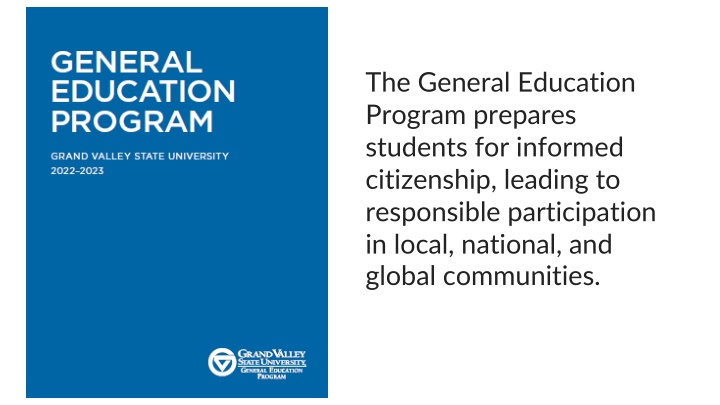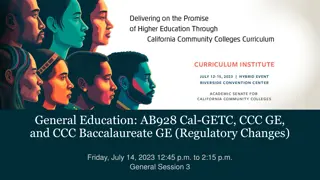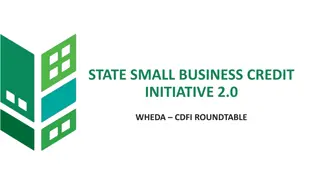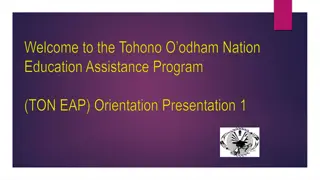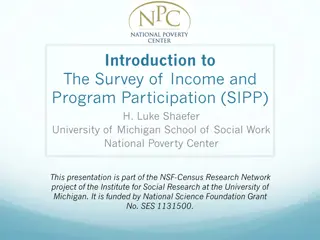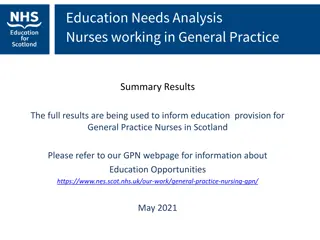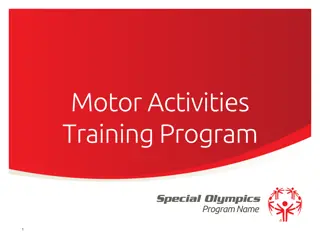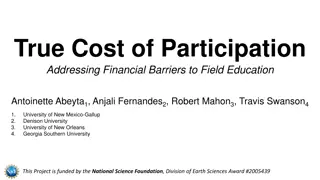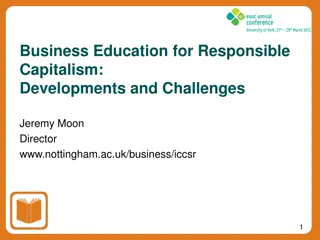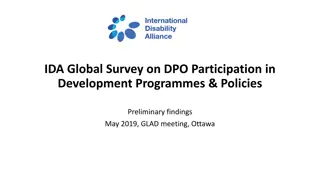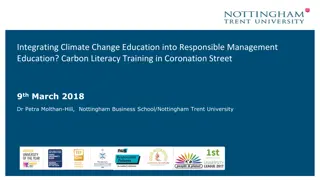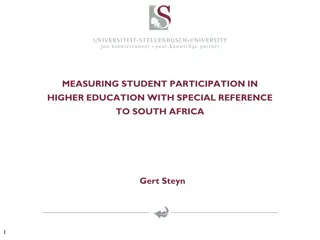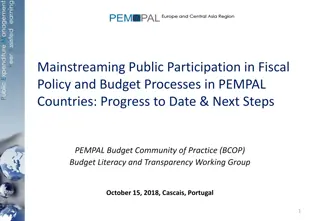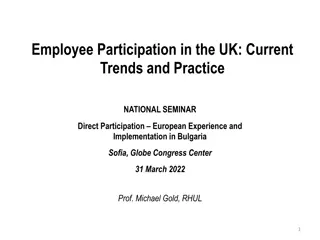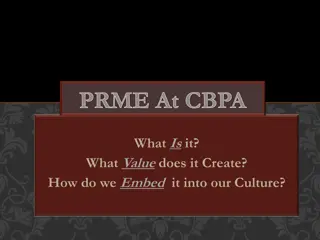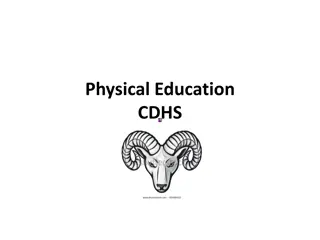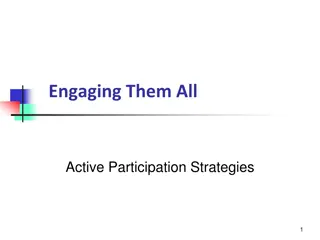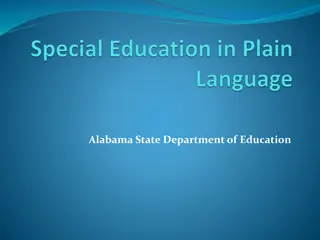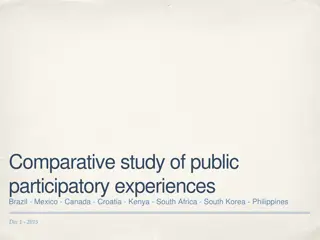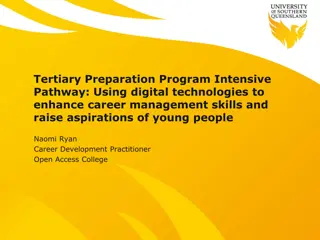General Education Program - Preparing for Responsible Participation
The General Education Program prepares students for informed citizenship and responsible participation in communities. It covers foundational areas of human thought, cultural recognition, and integration of learning experiences. Courses focus on diverse academic disciplines, multicultural perspectives, and compelling global issues. The program emphasizes collaboration, problem-solving, and skill development at various levels.
Download Presentation

Please find below an Image/Link to download the presentation.
The content on the website is provided AS IS for your information and personal use only. It may not be sold, licensed, or shared on other websites without obtaining consent from the author.If you encounter any issues during the download, it is possible that the publisher has removed the file from their server.
You are allowed to download the files provided on this website for personal or commercial use, subject to the condition that they are used lawfully. All files are the property of their respective owners.
The content on the website is provided AS IS for your information and personal use only. It may not be sold, licensed, or shared on other websites without obtaining consent from the author.
E N D
Presentation Transcript
The General Education Program prepares students for informed citizenship, leading to responsible participation in local, national, and global communities.
FOUNDATIONS [100-200 LEVEL] the major areas of human thought and endeavor. These courses present the academic disciplines as different ways of looking at the world, introduce you to the varied methods used to create knowledge, and acquaint you with major questions and principles of the field. Arts Historical Analysis Mathematical Sciences Physical Sciences Life Sciences Philosophy and Literature Social and Behavioral Sciences (2 courses from 2 different prefixes) Writing Faculty must teach 2-3 Knowledge and 2 Skills outcomes
Each GE Category has 1-3 Knowledge outcomes Each GE Category has 2-3 Skills outcomes
CULTURES [100-400 level] recognize yourself as a cultural being, and to understand the diverse ways in which people organize life and perceive the world. It enhances your ability to live and work intelligently, responsibly, and cooperatively in a multicultural nation and an interdependent world. Global Perspectives U.S. Diversity Faculty must teach 2 Knowledge and 2 Skills outcomes
ISSUES [300-400 level] integrate learning and co-curricular experiences to build connections between prior understanding and new learning. Issues courses are problem-solving courses that encourage cross-disciplinary collaboration within each class. They also develop your understanding of some of the most compelling issues of our time: globalization, health, human rights, identity, sustainability, and the connected topics of information, innovation, or technology. 2 Issues courses Faculty must teach 1 Knowledge and 3 Skills outcomes Issues are the unique aspect of our GE Program the point is teaching the skills of collaboration, problem solving and integration at the upper division level
Double Double- -dipping dipping Courses can double-dip be in 2 GE categories Foundations + Cultures Issues + Cultures Courses cannot Be in 2 GE Foundations Double-dip between Foundations and Issues You are responsible to TEACH and ASSESS Knowledge and Skills outcomes in BOTH categories if the course is in 2 categories.
1. 1. Read the category description for your course (see Read the category description for your course (see the GE Handbook at the GE Handbook at www.gvsu.edu/gened www.gvsu.edu/gened EXAMPLE-Foundations - Philosophy and Literature Literary and philosophical works represent an ongoing conversation about the fundamental ideas and values that shape cultures and civilization. To participate fully in this conversation requires knowledge, both of those works that are recognized as defining the history of the conversation and of works that offer original or critical additions to it in the present. Through the study of great works of philosophy and literature, you will come to understand more clearly your own response to the world and to the ideas that give it form and comprehensibility. Courses in this category introduce you to the interpretation of a significant body of literary or philosophical work and assist you in the careful reading, discussion, and analysis of primary texts.
2. Determine how you will teach the 2. Determine how you will teach the Knowledge student learning outcomes Knowledge student learning outcomes Example from Philosophy and Literature (see your syllabus attachments) Explain principles and questions that define philosophy or literature and its contributions to human knowledge and civilization. Explain the relationship between the works discussed, the cultures in which they were created, and the human concerns they illuminate. Analyze and interpret one or more primary texts as a major portion of course content. You have to teach ALL of the Knowledge outcomes
3. Determine how you will teach the Skills 3. Determine how you will teach the Skills student learning outcomes for your course student learning outcomes for your course Read the definition of the Skill and the objectives associated with it. You have to teach ALL of the objectives. All of the Skills must be taught and assessed regardless of the course modality (online, hybrid, face to face).
General Education teaches the Knowledge and General Education teaches the Knowledge and Skills society wants. Skills society wants.
Specific to GE Specific to GE Source: How College Contributes to Workforce Success: Employer Views on What Matters Most, AAC&U, 2021 Specific to GE
GE (and University) Student Learning Outcomes We don t have: Digital literacy Creative thinking Civic skills
Majors provide SWS (and the major) Majors provide
